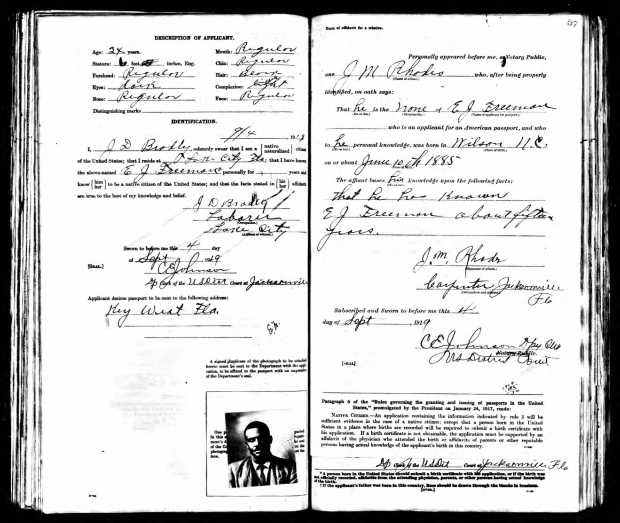Andrew Cotton applied for a Seaman’s Protection Certificate in May 1936. American seamen carried the document as proof of citizenship in foreign ports. Per his application, Cotton was born 19 June 1904 in Sharpsburg, North Carolina; resided at 207 West 137th Street, New York City; and had last worked on the S.S. Evangeline as a waiter. He was 5’8″ with dark brown skin, brown eyes and black hair and had no identifying marks.
In the 1910 census of Toisnot township, Wilson County: on Levy Edwards Road, Isaac Cotton, 44; wife Flonnie, 34; and children Coloneous, 18, Lucy, 16, Sidney, 13, Mary, 11, Isaac E., 8, Andrew, 6, Levy, 4, and Clarence, 1.
Passenger lists from 1938 to 1954 show Cotton shipping out of ports on both sides of the Atlantic, including New York, New York; Yarmouth, Nova Scotia; Saint Georges and Hamilton, Bermuda; Port of Spain, Trinidad and Tobago; Hamburg, Germany; Gourock, Scotland; Southampton, England; Cobh, Ireland; and Genoa, Italy.
U.S. Applications for Seaman’s Protection Certificates, 1916-1940 [database on-line], http://www.ancestry.com; original document at Application for Seaman’s Protection Certificates, 1916-1940, Records of the Bureau of Marine Inspection and Navigation, 1774-1982, Record Group 41, National Archives, Washington, D.C; New York Passenger Lists, 1820-1957 [database on-line], http://www.ancestry.com.








